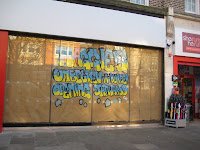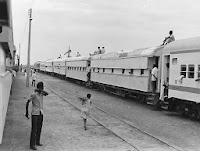What is slightly surprising is that one of the 'News' stories which is hitting the UK press to the max is the
Grillo Sisters versus The Saatchis. Why is is that the press proprietors and their appointed editors think that at a time of turmoil we should want to read about this?
My theory is that:
1) It satisfies something in their (
the media titans) desire to point the microscope on a small privileged elite of which many in the worlds of media, politics and celebrity flourish so that they can use their personal contacts and context.
2) It provides a story that shows even if you are rich, attractive and successful it doesn't mean you'll be happy - we all have feet of clay
For my part I see that it shows (again) what a friend of mine pointed out about a particularly well known dedicated left-wing politician cut from patrician cloth - they seek to relate to the mass but think 'they're not like us' - this is crystal clear to me from the exclusive interviews and the beseeching of the friends and family of Nigella.
 |
| Nigella in happier days |
Because she doesn't come from a background that includes run-down housing and poor education there seems to be an assumption that the law of the land with respect to Class A drugs works differently and that she can maintain her position as a
'domestic goddess'. I do not believe as an individual that the present drugs laws are providing troubled users within society with the framework they need to deal with life but I do believe that Nigella is at least as responsible for her actions as a mother on a 'sink' housing estate.
Let's see how this all pans out (forgive the pun).
Reflecting on Media Technology (part 2)
Yesterday I ruminated on how technology had been such a large part of my formative years.. let's move on to my time at university and my first full time job.
My A level results meant that I was able to continue in full time education at the time I was doing this Degree level education was not something that was as all pervasive as it is today, I was luck enough to get all fees paid as well as a local education authority grant towards my 'maintenance'.
The A levels I took (Maths, Physics and Technical Drawing) were well aligned with thew study of engineering and I took my place at
University in Cardiff of an Electrical and Electronic Engineering course.
The course I took was very much an engineering course with an emphasis on mathematics and physics -the experience of living away from home and making new friends was a good one for me.
 |
| UWIST building |
In hindsight if a course with a more 'creative' element would probably have suited me well but I'm not sure that such courses existed at this time (I think courses like those now available at places
Ravensbourne College would have been great for me).
The background of the technology at this time (the mid to late 70s) was one where microprocessors were beginning to become part of everyday life and satellite communications were maturing.
The technological industries were still dominated by large private and public companies and the value of entrepreneurs was unappreciated (
Clive Sinclair and
Alan Sugar were though starting to make their mark).
As a student my life was dominated by socialising, music and thinking I knew everything, after graduating my first employment at
Marconi Radar in Chelmsford was something of a shock - I didn't know everything and was answerable to people who (at the time) seemed to have a different life view to my own.
 |
| Marconi's used to dominate Chelmsford. |
In work I did learn how to diagnose fault situations and came into contact with early automated testing methods - during my time at University I had thought that I'd be working at recording studios and working in a factory did not provide the same glamour - I was looking for something more gratifying pretty much from my first day at Writtle road as well as looking for more interesting work I did look at the possibility of further study in the USA to become part of the microprocessor revolution
..(more to follow)
















































